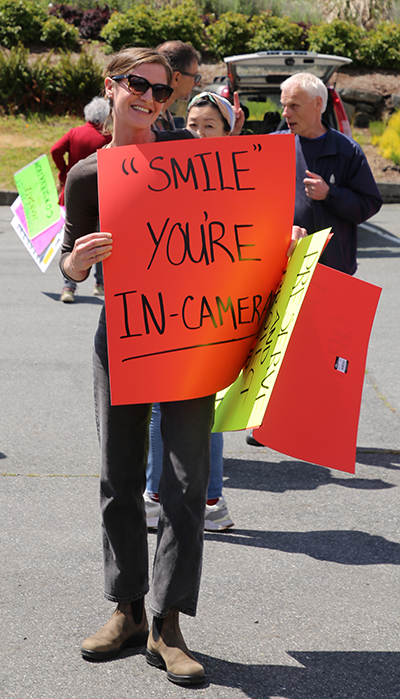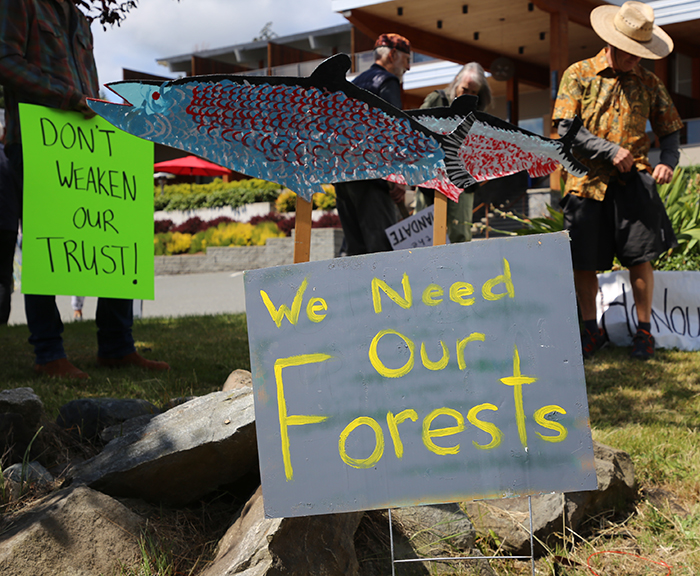About 50 people from Salt Spring, Galiano, Pender and Gabriola islands gathered at the Harbour House Hotel on Tuesday to press Islands Trust Council (ITC) to recommit to the original “preserve and protect” environmental mandate of the Islands Trust.
ITC is meeting at the Salt Spring Island hotel for its quarterly meeting from June 18 to 20.
According to a media release issued by three groups — the Trust-wide Friends of the Gulf Islands, plus Keep Salt Spring Sustainable and Positively Forward from Salt Spring Island — the demonstrators want ITC members to protect the Islands Trust area from the threat of over-development and are urging the Trust to uphold its mandate: “to preserve and protect the Trust Area and its unique amenities and environment” for all British Columbians.
Protestors stated that they are alarmed by a Trust Council “determination” that “unique amenities” to be protected in the Trust Area may now include “housing, tourism and infrastructure,” as stated following an in-camera council meeting held Sept. 26, 2023, “none of which is unique.”
“Also, trustees have stated that the ‘environment’ extends to humans,” the release continues. “This redefinition of the mandate is reflected in a new draft of the Trust Policy Statement, the umbrella document governing land use on all the islands. The new draft fails to specify that the environment means the natural environment and to set meaningful guardrails around development.”

Ron Hawkins is a Salt Spring resident who attended the June 18 protest.
He said he was there because the current group of elected trustees from the 13 major islands “are not listening and seem to have their minds made up in the direction of more and more development.”
He said he believes that affordable housing needs to be planned and properly delivered.
“And it’s the role of the government to make that, not to proliferate views about more and more development,” he said.
Pender Island resident Julia Nicholls was also at the event. She said private land is being clearcut on Pender with the resulting loss of habitat, “and the Trust is not doing very much about it.”
She said despite the Islands Trust having a 50-year history of preserving and protecting the Trust Area, “there’s been a huge loss of biodiversity” in that time.
“And we want to bring light to the fact that [trustees] are using language that is making it sort of more fluffy and harder to enforce things.”
Among delegations formally presenting to council in the afternoon were Galiano Island resident Jennifer Margison for Friends of the Gulf Islands, and Ron Wright representing Keep Salt Spring Sustainable (KSSS).
Margison was critical of wording in the recently released draft Trust Policy Statement, which all islands’ official community plans and bylaws must be in sync with.
“Wording is critical and ambiguity is a death knell,” she said. “This document is rife with slippery words such as “considered,” “should,” “strive to ensure,” . . . such words make the policies mere suggestions and could pit trustees and their communities against one another in futile attempts to find current, coherent direction.”
Wright said he and other members of KSSS are “alarmed as others have been here this afternoon by the content and the process of draft changes to the Trust Policy Statement. He said the writers of the Islands Trust Act “chose their words carefully” in using the term “unique . . . The act means exactly what it says: ‘unique amenities’ are things found nowhere else.”
He also questioned why a 1986 position paper issued by the Trust and provincial government’s municipal affairs ministry was not referred to when Trust Council announced that its interpretation of the “unique amenities” referred to in the Trust object was being broadened to include elements beyond the natural environment.
“How very odd that the so-called ‘all previous legal opinions’ that you claim to have examined do not include this most thorough and important legal precedent done in 1986 after wide public discussions, not in a secret back room in one day,” he said, referring to the Sept. 26, 2023 in-camera meeting where the Trust object was discussed by council.
He said the Trust was being undermined and “gutted from within” by some elected trustees, who did not support the Trust mandate.
“It’s a slow-motion coup to overthrow the very purpose of the Islands Trust,” he concluded.
Comments on delegations are scheduled for late Thursday morning in the Trust Council meeting agenda.



Humans are indeed part of the environment. Any organization that would have any problem with that factual statement just lost my support.
One has to be careful though. Often, “human” is code for “economy.” In this case, “human” stands for “housing, tourism and infrastructure” rather than human as “part of the environment” who needs clean air, drinking water, food and shelter.
If the IT is going to go all “sustainable development” (versus a clear mandate to put environmental issues and concerns first), then they’d better learn and follow the principles and processes of sustainable development.
Thank you, Justin C. Understanding how we are all connected needs to be understood. Let’s keep getting the message out.